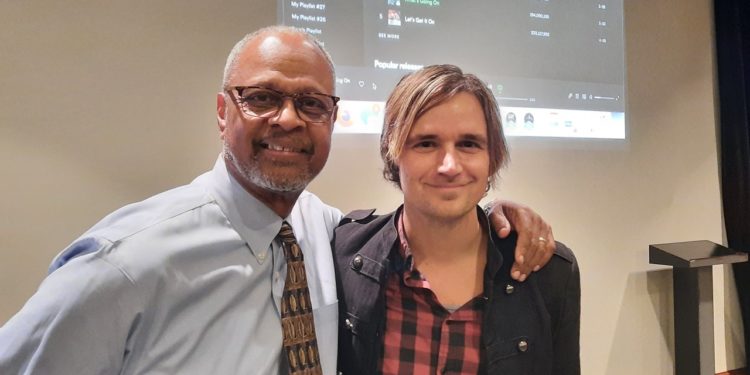On the afternoon of Feb. 23, the Office of Diversity and Intercultural Initiatives presented “A Brief History of African American Music.” Hosted by Assistant Professor Steven Potaczek and Associate Professor Galen Jones, the talk facilitated an honest and thoughtful discussion among those in attendance. The conversation tackled a number of current issues facing the country, including silence in the face of injustice and the tendency to relegate Black culture to mere entertainment.
The discussion was kickstarted with the music video of “This is America,” the Childish Gambino track that swept the 2019 Grammys, winning everything from Best Music Video to Song of the Year — the first rap song to win this award.
Both the song and its video showcase themes about the racial violence against communities of color that persist into modern day America, and those themes opened up the room to conversation.
Jones began, speaking about the silence on racial injustice that he has witnessed, including silence from his fellow Christians. He recalled a time he was guest speaking at a church near his hometown of Cincinnati. In the past few years leading up to his visit, the city had seen a long series of police murders. While there, a white woman approached him and whispered “I’m sorry.”
Jones responded by asking her “Why are you whispering?”
Potaczek and audience members joined in on the discussion, recounting times in their own lives when they had witnessed racism at play, and times they’d been judged for not falling along racial lines or for siding with “the other.” They also talked about how society can breed these exclusionary mentalities; as one attendee put it, “it’s not just learned, it’s embraced,” a sentiment that Jones considered profound.
Another topic explored was how Black culture is so often relegated to mere entertainment instead of being taken seriously on its own merits. This was yet another theme “This is America” exemplified through the ironic juxtaposition of a jovial, dancing Childish Gambino surrounded by brutal violence.
A specific example of this subject is how often Christian worship is dominated by white, evangelical music sensibilities, and how deviation from this style is regarded as a novelty, or a simple change in pace before they “get real again.”
It was noted how almost all musical genres are filled with Black and brown artists, but when it comes to Christian music, very few make their way into the public eye. Potaczek believes this lack of diversity, especially when it comes to the church, is a serious problem, one that he continues to struggle with.
“We’re not supposed to be in the back seat on this, we’re supposed to be in the front,” said Potaczek.
Following this, the discussion turned to ways that these issues are reflected in our own campus. This includes the problems some students have expressed with the current state of Campus Worship convocation, such as the limited variety of worship styles, or the disinterest in many of its attendants, who see the hour as little more than a required credit.
Jenee Spencer, the Director of Diversity Education and Development for the Office of Diversity and Intercultural Initiatives, hopes that students feel safe talking about these issues with others in their community, being both thoughtful and constructive about ways we can improve.
“It is perfectly fine to bring attention to areas that need attention,” said Spencer.
One way students can make their voices heard is by filling out an SGA Constituent Report. A QR code and link to fill out a report can be found within the weekly Campus Connection emails, or by following the link below. Anybody with a concern or suggestion is encouraged to make their voices heard.
https://samford.presence.io/forms

Contributing Writer





